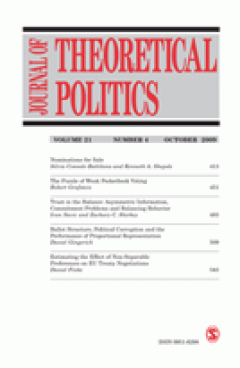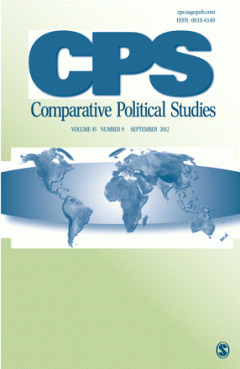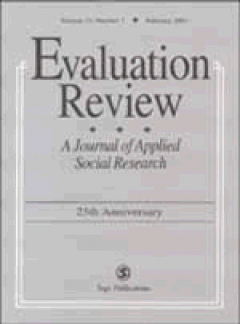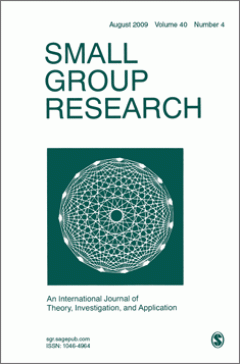Filter by

Probabilistic voting equilibria under nonlinear candidate payoffs
The ‘mean voter theorem’ implies that candidates should choose identical policy positions in a two-candidate race if voting is probabilistic. This result is in fact an artifact of the assumption that the candidates maximize expected vote share or probability of win, which is not true for many real-world elections. In this paper I analyze a probabilistic voting model in which the candidates have…
- Edition
- Vol. 24 no. 2, April 2012.pp. 235-247
- ISBN/ISSN
- 09516298
- Collation
- -
- Series Title
- Journal of Theoretical Politics
- Call Number
- -

Why does the majority party bother to have minority party members on committees?
Why would a generic parliament have committees with minority party members? If the majority party considers minority party committee members a burden, then it could choose to exclude minority party members entirely from the committee system. This, however, has rarely happened in history. In this paper, I provide an informational rationale for the bipartisan committee system through a simple sig…
- Edition
- Vol. 24 no. 2, April 2012,pp. 248-264
- ISBN/ISSN
- 09516298
- Collation
- -
- Series Title
- Journal of Theoretical Politics
- Call Number
- -

Groseclose and Snyder in finite legislatures
The Groseclose and Snyder (1996) model is one of the best-known models of vote buying in legislatures. Although the logic of the model is compelling, it is not clear that its key propositions, derived in a continuous set-up, hold in finite legislatures. This is an important issue because many real-world legislatures are small and should be modeled as finite in order to make predictions on coali…
- Edition
- Vol. 24 no. 2, April 2012,pp. 265-273
- ISBN/ISSN
- 09516298
- Collation
- -
- Series Title
- Journal of Theoretical Politics
- Call Number
- -

Managing expectations
Followers of law, politics and business commonly relate stories of individuals who appear to predict an expected performance level below what they believe themselves to be capable of. The standard explanation for such rhetoric is that it hedges against the negative consequences of unanticipated failures and takes advantage of unexpected successes. Although the strategy appears highly attractive…
- Edition
- Vol. 24 no. 2, April 2012,pp. 274-302
- ISBN/ISSN
- 09516298
- Collation
- -
- Series Title
- Journal of Theoretical Politics
- Call Number
- -

Leaning Right and Learning From the Left : Diffusion of Corporate Tax Policy …
There is an increased focus in comparative politics and international relations on how choices of governments are dependent on choices made by other governments. The authors argue that although the relationship between policy choices across countries is often labeled as either diffusion or competition, in many cases the theoretical mechanisms underpinning these labels are unclear. In this artic…
- Edition
- Vol. 45 no. 3, March 2012,pp. 283-311
- ISBN/ISSN
- 00104140
- Collation
- -
- Series Title
- Comparative Political Studies
- Call Number
- -

Fragile Snapshot or Stable Relationships? : What the Orange and Rose Revoluti…
One of the long-standing criticisms of cross-sectional survey data is that they provide only a contextually driven “snapshot” of attitudes. These attitudes are, the “snapshot critique” contends, highly fragile—subject to significant fluctuation based on events that arise domestically and globally. Although it makes sense that a major event can alter the percentage of people who respond to a giv…
- Edition
- Vol. 45 no. 3, March 2012,pp. 312-340
- ISBN/ISSN
- 00104140
- Collation
- -
- Series Title
- Comparative Political Studies
- Call Number
- -

An Irrational Party of Rational Members : The Collision of Legislators’ Ree…
This study presents a new explanation to a puzzle regarding the reluctance of the Japan Socialist Party (JSP) to moderate its hard-liner Marxist platform. The author does so by focusing on the preferences and strategies of individual JSP members, in contrast to previous studies that treat the party as a unitary actor. The author shows that Japan’s electoral system created a unique environment i…
- Edition
- Vol. 45 no. 3, March 2012 ,pp. 341-365
- ISBN/ISSN
- 00104140
- Collation
- -
- Series Title
- Comparative Political Studies
- Call Number
- -

The Political Effectiveness of Terrorism Revisited
Terrorists attack civilians to coerce their governments into making political concessions. Does this strategy work? To empirically assess the effectiveness of terrorism, the author exploits variation in the target selection of 125 violent substate campaigns. The results show that terrorist campaigns against civilian targets are significantly less effective than guerrilla campaigns against milit…
- Edition
- Vol. 45 no. 3, March 2012,pp. 366-393
- ISBN/ISSN
- 00104140
- Collation
- -
- Series Title
- Comparative Political Studies
- Call Number
- -

Assessing the Impact of Lustration on Trust in Public Institutions and Nation…
Lustration is alternately theorized and anecdotally alleged to either undermine or contribute to the democratic transitions in Central and Eastern Europe (CEE) by supporting or undermining trust in public institutions, and by extension trust in national government. Using quantitative data on nine countries in CEE, this study examines the impact of lustration and transitional justice measures on…
- Edition
- Vol. 45 no. 4, April 2012,pp. 412-446
- ISBN/ISSN
- 00104140
- Collation
- -
- Series Title
- Comparative Political Studies
- Call Number
- -

Combining Federalism and Decentralization : Comparative Case Studies on Regio…
Studies evaluating the effects of territorial state organization on the performance of democratic political systems produce ambiguous results. The authors argue that research so far has suffered from insufficiently conceptualizing federalism and decentralization as two distinct dimensions. This article makes use of the advantages of a nested design and detects micro-level causal mechanisms unde…
- Edition
- Vol. 45 no. 4, April 2012,pp. 447-476
- ISBN/ISSN
- 00104140
- Collation
- -
- Series Title
- Comparative Political Studies
- Call Number
- -

Anxious Publics : Worries About Crime and Immigration
In this article the authors investigate the relationship between concerns about crime and concerns about immigration. Panel survey data from Germany allow the authors to examine people’s views about immigration as they develop over time, showing that consternation about crime is a significant predictor of anxiety over immigration. Moreover, it has a greater substantive impact than other explana…
- Edition
- Vol. 45 no. 4, April 2012,pp. 477-506
- ISBN/ISSN
- 00104140
- Collation
- -
- Series Title
- Comparative Political Studies
- Call Number
- -

Use of Propensity Score Matching to Evaluate a National Smoking Cessation Med…
Sustained mass media campaigns have been recommended to stem the tobacco epidemic in the United States. Propensity score matching (PSM) was used to estimate the effect of awareness of a national smoking cessation media campaign (EX®) on quit attempts and cessation-related cognition. Participants were 4,067 smokers and recent quitters aged 18–49 in targeted U.S. media markets. Controlling for po…
- Edition
- Vol. 35 no. 6, December 2011,pp. 571-591
- ISBN/ISSN
- 0193841X
- Collation
- -
- Series Title
- Evaluation Review
- Call Number
- -

An Ex Post Facto Evaluation Framework for Place-Based Police Interventions
Background: A small but growing body of research evidence suggests that place-based police interventions generate significant crime control gains. While place-based policing strategies have been adopted by a majority of U.S. police departments, very few agencies make a priori commitments to rigorous evaluations. Objective: Recent methodological developments were applied to conduct a rigorous ex…
- Edition
- vol. 35 no. 6, December 2011,pp. 592-626
- ISBN/ISSN
- 0193841X
- Collation
- -
- Series Title
- Evaluation Review
- Call Number
- -

Covariate Imbalance and Precision in Measuring Treatment Effects
Covariate adjustment can increase the precision of estimates by removing unexplained variance from the error in randomized experiments, although chance covariate imbalance tends to counteract the improvement in precision. The author develops an easy measure to examine chance covariate imbalance in randomization by standardizing the average covariate difference between the treatment and control …
- Edition
- Vol. 35 no. 6, December 2011,pp. 627-641
- ISBN/ISSN
- 0193841X
- Collation
- -
- Series Title
- Evaluation Review
- Call Number
- -

Reconciling the Multiple Objectives of Prison Diversion Programs for Drug Off…
Background: In recent years, several states have created mandatory prison-diversion programs for felony drug possessors. These programs have both individual-level goals of reducing recidivism rates and system-level goals of reducing prison populations. Objective: This study examines the individual level and system level impact of Kansas’ Senate Bill 123 (SB 123), which created mandatory probati…
- Edition
- Vol. 35 no. 6, December 2011,pp. 642-672
- ISBN/ISSN
- 0193841X
- Collation
- -
- Series Title
- Evaluation Review
- Call Number
- -

Evaluating Free-Choice Climate Education Interventions Applying Propensity Sc…
Background and objectives. The majority of environmental education takes place in informal settings, of which so-called free-choice learning is typical. What is understood by this is a kind of learning which is self-determined and driven by the needs and interests of the learner. The voluntariness of participation in interventions and the fact that they take place in turbulent action settings l…
- Edition
- Vol. 35 no. 6, December 2011,pp. 673-722
- ISBN/ISSN
- 0193841X
- Collation
- -
- Series Title
- Evaluation Review
- Call Number
- -

Meetings at Work : Advancing the Theory and Practice of Meetings
Although advances in communication technology were once expected to diminish the need for synchronous work meetings, meeting activity in organizations continues to rise. Regrettably, the time and energy employees spend in work meetings is not matched by the amount of direct attention group and organizational scholars have paid to meeting phenomena. This special issue of Small Group Research hel…
- Edition
- Vol. 43 no. 2, April 2012,pp. 127-129
- ISBN/ISSN
- 10464964
- Collation
- -
- Series Title
- Small Group Research
- Call Number
- -

Meetings Matter : Effects of Team Meetings on Team and Organizational Success
This study follows the idea that the key to understanding team meeting effectiveness lies in uncovering the microlevel interaction processes throughout the meeting. Ninety-two regular team meetings were videotaped. Interaction data were coded and evaluated with the act4teams coding scheme and INTERACT software. Team and organizational success variables were gathered via questionnaires and telep…
- Edition
- Vol. 43 no. 2, April 2012,pp. 130-158
- ISBN/ISSN
- 10464964
- Collation
- -
- Series Title
- Small Group Research
- Call Number
- -

The Meeting Genre Across Cultures : Insights From Three German–American Col…
The current study examines cross-cultural differences in norms for meetings. Following Eisenhardt, we used a broad set of conceptual dimensions for analyzing meetings as a genre of organizational communication (Yates & Orlikowski) to guide a within- and cross-case analysis of meetings in two cultures. Our goal was to discover the possible existence of patterns and interpretations within culture…
- Edition
- Vol. 43 no. 2, April 2012,pp. 159-185
- ISBN/ISSN
- 10464964
- Collation
- -
- Series Title
- Small Group Research
- Call Number
- -

Team Meeting Attitudes : Conceptualization and Investigation of a New Construct
Although most work teams use meetings as a tool for accomplishing their objectives, there is little research examining meeting-related variables in teams. In this article, we propose a new construct, team meeting attitudes (TMA), that involves individuals’ thoughts, feelings, and evaluations of team meetings. We constructed a scale that measures individuals’ TMA, and we report on the scale’s ps…
- Edition
- Vol. 43 no. 2, April 2012,pp. 186-210
- ISBN/ISSN
- 10464964
- Collation
- -
- Series Title
- Small Group Research
- Call Number
- -
 Computer Science, Information & General Works
Computer Science, Information & General Works  Philosophy & Psychology
Philosophy & Psychology  Religion
Religion  Social Sciences
Social Sciences  Language
Language  Pure Science
Pure Science  Applied Sciences
Applied Sciences  Art & Recreation
Art & Recreation  Literature
Literature  History & Geography
History & Geography